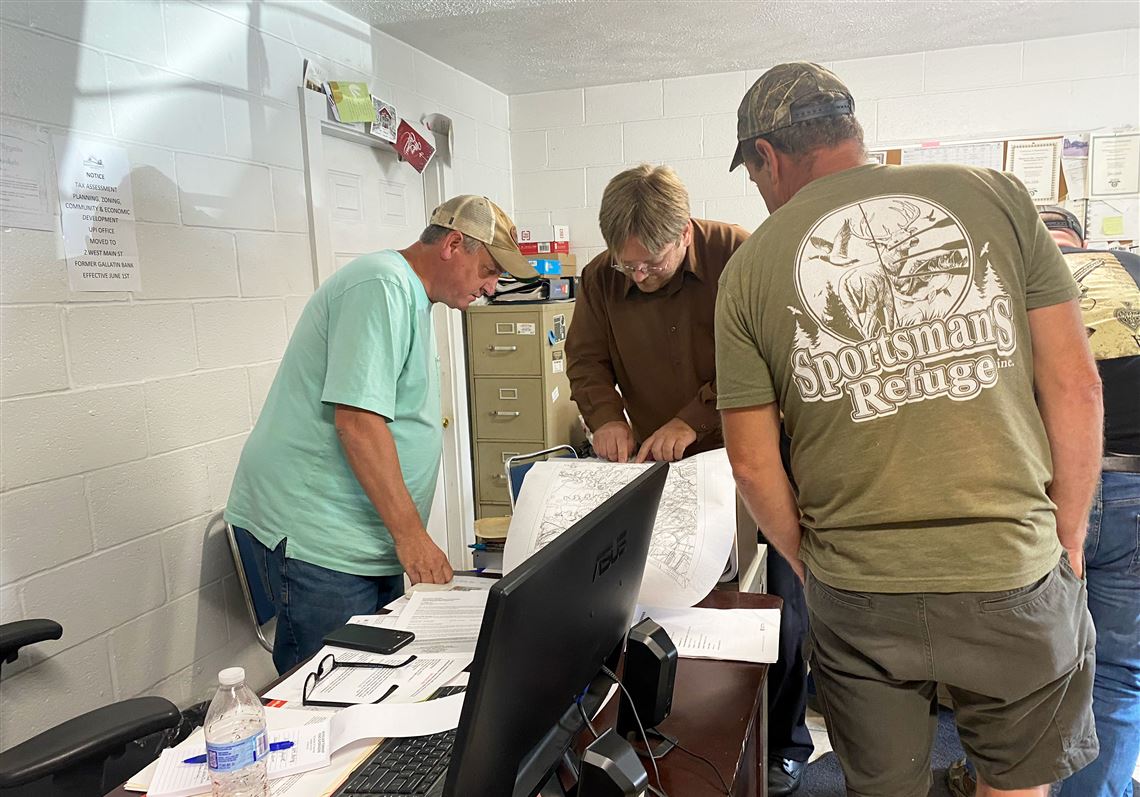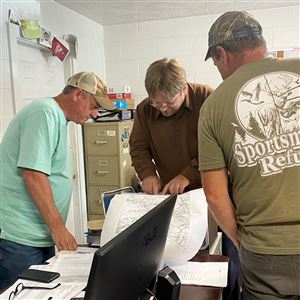Residents of Nicholson Township, Fayette County, have banded together in an attempt to stop federal regulators from issuing a disposal well permit that, if approved, would store up to 77,500 gallons of wastewater from fracking each month underground.
Nicholson is made up of farmland that has been passed down through generations since the late 1800s; the town’s economy depends on agriculture, tourism and the natural areas Nicholson offers, township officials said.
“We were born and raised here,” said Michael Glebis, a lifelong resident of Nicholson. “These are our homes, friends, families, neighbors — we got to take care of one another.”
The permit application was submitted by G2 Stem LLC, based in Fairfax, Virginia, in late June 2022. The permit approval process usually takes six months, but can take longer, according to the Environmental Protection Agency.
Ciara McEneany
EPA: Company withdraws permit application for controversial disposal well in Fayette County
The well, Orville Higinbotham #1, was originally drilled in 1987 as an oil well by Douglas Oil and Gas, and was transferred to Alabama-based Diversified Resources in 2016. The site is 110 yards from the nearest home.
If the permit is approved, the well will be converted from an oil well to an injection well. Such conversions have become a national trend, but come with risks, said Gillian Graber, executive director and co-founder of Protect PT, an environmental nonprofit.
“The issue with converting the wells is, from an engineering standpoint, that the well was drilled to reduce pressure ... an injection well is much different as pressure is injected into the well,” said Ms. Graber
 The Environmental Protection Agency headquarters in Washington.An example of a conventional well being converted was in Plum Township, where ProtectPT opposed the project.
The Environmental Protection Agency headquarters in Washington.An example of a conventional well being converted was in Plum Township, where ProtectPT opposed the project.
Nicholson locals and Fayette County officials said they were not told of the application until a week and a half before the public comment period was ending. Residents went door to door to inform their neighbors of the public hearing.
Further, they said, the EPA held the hearing over Microsoft Teams which, according to federal regulations, is not allowed outside of an emergency order, officials said.
“Because the Covid-19 state emergency order was removed in 2021, the EPA is in violation of CFR 25.5 by doing only a virtual hearing,” said Ms. Graber.
When reached for comment, an EPA spokesperson emailed that the “EPA is currently in the process of reviewing all comments submitted during the public comment period, including comments made about holding an in-person hearing.
Mountain Watershed Association — an environmental nonprofit — hopes that the alleged violation gives Nicholson more time to get the application process restarted or, ultimately, fully denied.
“The permit has not properly obtained the safety requirements necessary; and that there was an abandoned well within a quarter-mile radius was not noted,” said James Cato, regional organizer for Mountain Watershed Association.
The application did not account for three abandoned oil wells, drinking wells, springs and cisterns, according to residents.
“The fact that they did not notice the other wells means that they may have missed other critical details,” said Mr. Cato.
Fayette County officials swiftly took municipal action and expressed their opposition to the EPA.
On July 18, County Commissioners Dave Lohr, Vincent Vicites and Scott Dunn wrote to the EPA stating that Nicholson “is not the proper location for this type of activity.” Two days later, the county passed an “injection well resolution” that stated any future permits of this kind will be rejected.
Nicholson isn’t the first township in the state to fight similar permits.
Grant Township, in Indiana County, had a years-long battle with environmental regulators and were even sued by the Pennsylvania Department of Environmental Protection due to the township’s home rule charter that banned any gas or injection wells. The DEP eventually rescinded the permit for the Yanity well in Grant Township in 2020.
Clara Township, in Potter County, is currently fighting against an EPA-issued permit to convert an oil well into an injection well. The Department of Environmental Protection is considering public comment on the issued permit until August 8th.
Nicholson residents also are concerned over G2 Stem LLC’s CEO, Fredric Gumbinner, who was charged with one count of conspiracy, one count of honest-services wire fraud, and two counts of federal programs bribery by the Department of Justice. Mr. Gumbinner is alleged to have exchanged bribes for law enforcement badges. G2 Stem LLC did not respond to a request to comment.
Nicholson residents worry about their personal liability as landowners if the injection well causes harm to their property.
“Innocent landowners living near and around the proposed well (many of whom are actively opposing the proposed permit) could be held financially responsible for contamination of their land and/or the groundwater under it,” said Representative Charity Grimm Krupa, who grew up in Nicholson and serves the 51st legislative district of Pennsylvania, in a written statement to the EPA.
Further, it’s estimated that 70 to 80 trucks a day transporting wastewater will be in Nicholson if the permit is granted, township officials said. The road where the well is located has sharp curves and steep drop offs — town officials do not believe local roads can handle the traffic.
“These are old backcountry roads,” said Mr. Glebis. “There’s always somebody wrecking. If one of these trucks full of wastewater comes around the corner and crashes, it’ll wind up in our local rivers and streams.”
Ms. Graber said that it’s rare for the EPA to not approve a permit request.
“By law, they have to take a look at it, but, ultimately, there is no incentive for the EPA to not issue a permit,” said Ms. Graber. “There’s only incentive for them to issue the permit because that’s what they’re in the business of doing.”
The Underground Injection Control (UIC) program — which began in 1984 for Region III of the EPA — has never denied a permit application, according to EPA Region III officials.
Nonetheless, Nicholson and Fayette County residents said they do not plan to give up.
“I mean, I don’t know how successful we will be, but we want to be able to try,” said Mr. Glebis. “The most important thing is we get the information out there.”
Ciara McEneany: cmceneany@post-gazette.com.
First Published: August 7, 2023, 9:30 a.m.
Updated: August 8, 2023, 9:55 a.m.


















